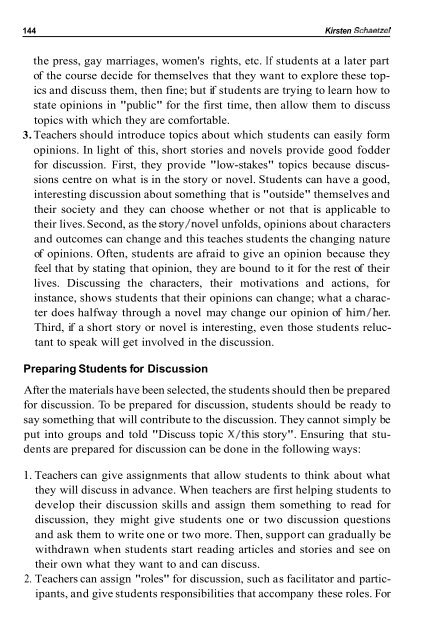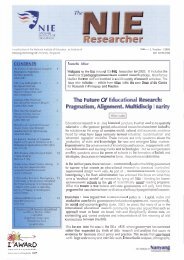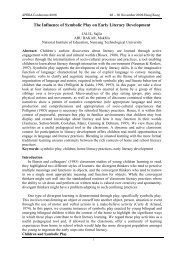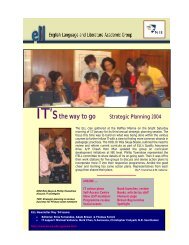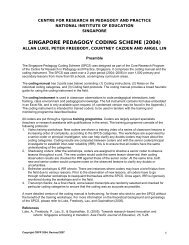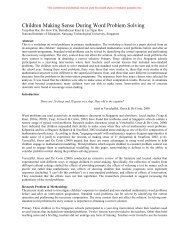Cooperative Learning - NIE Digital Repository - National Institute of ...
Cooperative Learning - NIE Digital Repository - National Institute of ...
Cooperative Learning - NIE Digital Repository - National Institute of ...
You also want an ePaper? Increase the reach of your titles
YUMPU automatically turns print PDFs into web optimized ePapers that Google loves.
144 Kirsten Schaetzelthe press, gay marriages, women's rights, etc. If students at a later part<strong>of</strong> the course decide for themselves that they want to explore these topicsand discuss them, then fine; but if students are trying to learn how tostate opinions in "public" for the first time, then allow them to discusstopics with which they are comfortable.3. Teachers should introduce topics about which students can easily formopinions. In light <strong>of</strong> this, short stories and novels provide good fodderfor discussion. First, they provide "low-stakes" topics because discussionscentre on what is in the story or novel. Students can have a good,interesting discussion about something that is "outside" themselves andtheir society and they can choose whether or not that is applicable totheir lives. Second, as the story/novel unfolds, opinions about charactersand outcomes can change and this teaches students the changing nature<strong>of</strong> opinions. Often, students are afraid to give an opinion because theyfeel that by stating that opinion, they are bound to it for the rest <strong>of</strong> theirlives. Discussing the characters, their motivations and actions, forinstance, shows students that their opinions can change; what a characterdoes halfway through a novel may change our opinion <strong>of</strong> him/her.Third, if a short story or novel is interesting, even those students reluctantto speak will get involved in the discussion.Preparing Students for DiscussionAfter the materials have been selected, the students should then be preparedfor discussion. To be prepared for discussion, students should be ready tosay something that will contribute to the discussion. They cannot simply beput into groups and told "Discuss topic X/this story". Ensuring that studentsare prepared for discussion can be done in the following ways:1. Teachers can give assignments that allow students to think about whatthey will discuss in advance. When teachers are first helping students todevelop their discussion skills and assign them something to read fordiscussion, they might give students one or two discussion questionsand ask them to write one or two more. Then, support can gradually bewithdrawn when students start reading articles and stories and see ontheir own what they want to and can discuss.2. Teachers can assign "roles" for discussion, such as facilitator and participants,and give students responsibilities that accompany these roles. For


